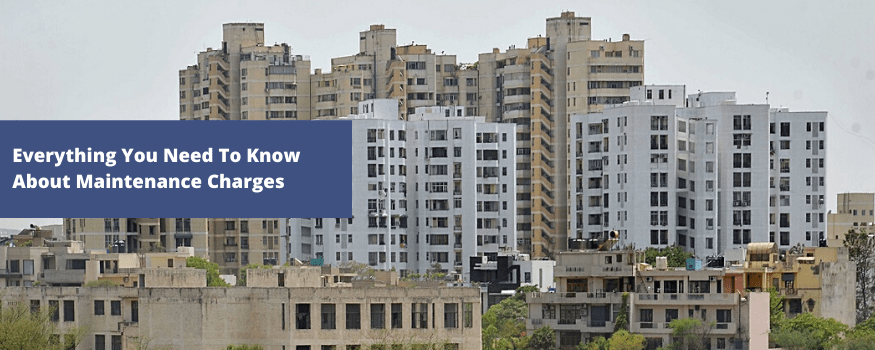Everything You Need To Know About Maintenance Charges

Mrigank Sharma, a first-time home buyer, who invested in a 3BHK flat knew was in for a rude shock when the developer asked for an extra Rs 2.5 lakhs against the original payment plan as part of maintenance charges. Little did he know that to get the complete possession of the flat he had to fufill these formalities.
Sharma’s experience only highlights the fact that property transactions can be tricky, if it is not understood properly.
The homebuyer should not only be cautious about the cost of the property, but also future expenses which the builder can levy. Maintenance charge is one such expense, which can significantly impact the property buying decision of end-users and investors alike, while buying an under-construction or a ready-to-move-in property.
The monthly outgo on maintenance charges can make a big difference to your personal finance and saving money on this can help you accumulate a significant amount in the long-term. This can be particularly useful during challenging times like now, when the world is passing through the Coronavirus pandemic.
What are maintenance charges?
The maintenance fee is an annual fee to be paid by the owners/ tenants for the maintenance, repair, operations, and upkeep of the building. It is the duty of the promoter/ developer to provide essential services like parks, gardens, lobbies, stairs, elevators, fire escapes, community centers, common parking areas, power light, etc, the things that are necessary for the existence, maintenance and safety of the society.
Meaning in context to Real estate
As per Section 11 (4)(g) of the RERA Act, 2016, it is the duty of the promoter, to pay all outgoings until he transfers the physical possession of the real estate project to the allottee or the associations of allottees, as the case may be. The outgoings include payment of local taxes, charges for water or electricity, maintenance charges, including mortgage loan and interest on mortgages or other encumbrances etc
Here is a guide for you that will help you understand every small detail about the maintenance charge and you can keep yourself prepared if you are a first-time buyer. Maintenance charge covers the infrastructure and some amenities:
- Lifts
- Emergency exits
- Fire and security
- Children’s play area
- Car Parking facilities
- Cleaning costs of common areas like the lobby and terrace
- Centrally controlled facilities like water and electricity
- Diesel generator cost
- Landscape maintenance charge
- Sewage treatment cost
- Amenities like swimming pool
- Contribution to the sinking fund
- Non agriculture tax
- Any other charges
The maintenance charge amount either depends on the individual flat or calculated on the basis of per square feet of the flat. In the initial few years, this cost is collected by the builder till an association forms. The newly formed association may change the costs or introduce new rules consistently for improvement of maintenance.
Things to keep in mind before booking a property
Check before booking
The homebuyers are required to pay maintenance charges which may vary from project to project. Buyers must check maintenance charges before booking the flat. This should be calculated before you decide to pay the booking amount to the developer. You must know how much you are supposed to pay as maintenance charges when you actually start living in a project.
Calculation of charges
Usually housing societies levy the maintenance charges as per the area of the flat while others fix it on other variables when all the apartment are of the same size in that society. Also, a homebuyer should know the facilities provided under the charge. There are instances when builders charge advance maintenance cost for one or two years at the time of possession. Once you know how the maintenance charges are calculated, you have a basic idea on how much you are supposed to pay. Buyers should agree for only reasonable charges and not any arbitrary demand.
Time to pay
You will be asked to pay maintenance charges at the time of possession. The charges in all societies vary depending on the amenities and location. Some builders may ask you to pay maintenance charges for two years when you take possession but it depends on the builder and the time taken for forming the RWA. Since maintenance charges are applicable from the time a flat is occupied, its basic motive is to fund operations related to upkeep, maintenance, and upgrade of areas which are not directly under any individual’s ownership. RERA’s provisions enjoin upon the developer to see that residents don’t pay ad hoc charges.
Pay after possession is delivered
Some developers ask you to pay maintenance charges along with the electricity meter and other charges due before giving you the keys. You should not pay maintenance charges if project registry has not been made and you do not have an occupancy certificate from the builder. You should only pay the maintenance charge once possession has bee delivered to you.
Resident right and defaults
Once the RWA of your society is formed, you should take part in the process and make sure that the maintenance charges are reasonable. There should be no exception and you should not pay for housing units retained by builders as investment. You can look at the actual amount spent by the builder on maintenance, along with the break-up. It is the residents’ right to be aware of the amount spent by the builder on maintenance and ensure that he is not paying more than required. Till a society is formed, a builder pays for the maintenance and has to keep his books open for scrutiny by the residents.
Are you queries to know more? Then click here for the available legal remedy under RERA and FAQs related to maintenance charges. In the meantime, please visit our legal help desk page for further legal help.
